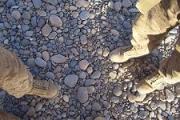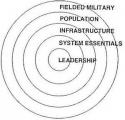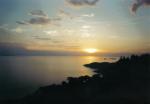I’ve read some interviews and had a chance to speak with several folks directly involved with police training in Iraq and Afghanistan and have compared their views with some of my own observations about policing in a COIN environment. I think building capable, competent and committed police forces may be even more critical in some ways to defeating an insurgency in terms of winning and sustaining public support for the local governments that people actually live under, then national military forces.
The roles we normally think of police and military serving are different, and mixing the roles has consequences. We even go to lengths to ensure that politically, the control of the two forces is diversified. However, the conditions in the environment are not what most people in western states think of as those in which a police force operates in, police in Afghanistan and Iraq are subject to urban combat on a scale that makes the LA bank robbery that went down several years ago (in which robbers used Kevlar and military type weapons to prolong a serious shootout) pale by comparison; nor would you quite equate it to the conditions we've sometimes seen with regard to stand offs with domestic extremist groups. In Iraq and Afghanistan the host nation police operate in the same conditions that our own combat troops do (many of the SWC know this, but there may be a few lurkers who don’t).
The operational environment is such that separating purely insurgent activities from organized crime, murder, etc. is difficult – maybe indistinguishable. Crime is often a source of revenue for insurgent activities, and a case could be made that even if they are not sometimes directly related, they certainly benefit from each other – as the two activities are often so similar that security resources are challenged to distinguish the two, and allocate resources accordingly.
Police are certainly a prime target in an insurgency – in some ways they are perhaps more a symbol of a government’s ability (or inability) to provide domestic security, public order and governance then the military is, and if that capacity is fulfilled by the military then it means the government has been effectively challenged. The longer that government has to use its military to fulfill the police role there is an increasing perception of weakness on the part of the government to fulfill its most basic of functions. Effective policing is a symbol of rule of law and normalcy which allows societies to function and grow,
While I was an advising I considered the challenges of the IA and IP to be similar in terms of the enemy they faced, however, neither appeared to be optimally manned, organized, trained, equipped, or advised to meet the challenges the insurgents and criminal elements posed, but the Iraqi Army seemed better set to do so – from the level of U.S. support and advising, to the access to a regional support unit – that while not perfect, was far better structured through MoD then the IP were through MoI. The IA at least had many of the tools from which to adapt. The IP were kind of a weak sister – funded, organized, trained, equipped & manned for basic police functions, they were extremely challenged to try and fulfill there role in an environment where even combat troops fought a clever and adaptive enemy who had access to IEDs, RPGs, Mortars, SVBIEDs, PBIEDs, Sniper Rifles and many other tools of modern warfare. The insurgents certainly understood this, and attacked what we thought of as the short leg in the three legged security stool (IA, IP and CF). The insurgents knew that if that leg was broken off, then the ability to maintain balance on the other two legs was more challenging, and put a much greater strain on the coalition, the IA and the local and national government.
What are the thoughts in the SWC on:
Policing in counter insurgency?
Capability gaps in policing – such as why some states establish a gendarme, or paramilitary organization? What are good models and why (ex. Why would a model based on the Spanish Guardia Civil work in one place but maybe not another – create, or pick a model – base it off things like intel, maneuver, force pro, sustainment, specialized capabilities like EOD etc, or whatever works.
Capability gaps in our ability to train, advise or assist states with capability gaps in areas we don’t have a cultural understanding of due their absence in our own societies?
Ways we might leverage other states who do understand it, and the implications of doing so? Ways we might better leverage our own resources
HN military taking on functions that might better reside with HN police?
The dangers in trying to build HN police forces that are inadequate for the environment they have to operate in?
Also feel free to address what the impacts are on the way we (or anybody else) does business from the standpoint of titular authority and responsibilities.
What are the implications for future operations – both our ability to conduct stability type operations, our ability to enable civil authority as a domestic mission (think support to local govt in crisis response), and other homeland security issues?
Also feel free to import other emerging models – such as existing national police forces, etc., or to discuss other justice type functions such as penal systems – courts, judges and jails.
Ben – although I know you don’t post too much, that you are thinking about this – would be interested to hear your thoughts – Slap and others same goes.
Best, Rob



















Bookmarks